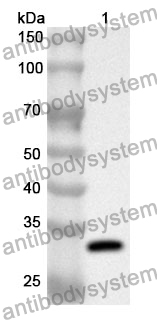Catalog No.
PHF00101
Species reactivity
Human, Mouse, Rat
Host species
Rabbit
Isotype
IgG
Clonality
Polyclonal
Immunogen
E. coli - derived recombinant Human HCCS (Met1-Ser268).
Tested applications
ELISA: 1:4000-1:8000, IHC: 1:50-1:100, WB: 1:1000-1:4000
Target
CCHL,HCCS,Holocytochrome c-type synthase,Cytochrome c-type heme lyase
Purification
Purified by antigen affinity column.
Accession
P53701
Applications
ELISA, IHC, WB
Form
Liquid
Storage buffer
0.01M PBS, pH 7.4, 50% Glycerol, 0.05% Proclin 300.
Stability and Storage
Use a manual defrost freezer and avoid repeated freeze thaw cycles. Store at 2 to 8°C for frequent use. Store at -20 to -80°C for twelve months from the date of receipt.
Precision targeting of β-catenin induces tumor reprogramming and immunity in hepatocellular cancers., PMID:40442146
Immunoscore Predicted by Dynamic Contrast-Enhanced Computed Tomography Can Be a Non-Invasive Biomarker for Immunotherapy Susceptibility of Hepatocellular Carcinoma., PMID:40149284
Clinical characteristics and treatment outcomes in multiple sclerosis patients treated with anti-CD20s who switched to fumarates: a retrospective analysis of a US healthcare claims database., PMID:39936542
ADARp110 promotes hepatocellular carcinoma progression via stabilization of CD24 mRNA., PMID:39808660
Comparison between two artificial intelligence models to discriminate cancerous cell nuclei based on confocal fluorescence imaging in hepatocellular carcinoma., PMID:39674779
NOTCH1 drives tumor plasticity and metastasis in hepatocellular carcinoma., PMID:39484457
Spatial Dynamics of T- and B-Cell Responses Predicts Clinical Outcome of Resectable and Unresectable Hepatocellular Carcinoma., PMID:39417698
Causal relationship between immune cells and hepatocellular carcinoma: a Mendelian randomisation study., PMID:38947379
Anti-BIRC5 autoantibody serves as a valuable biomarker for diagnosing AFP-negative hepatocellular carcinoma., PMID:38832035
CXCL9 Overexpression Predicts Better HCC Response to Anti-PD-1 Therapy and Promotes N1 Polarization of Neutrophils., PMID:38737384
Downstaging and laparoscopic hepatectomy plus intraoperative radiofrequency ablation for the treatment of initially unresectable multifocal hepatocellular carcinomas., PMID:38283063
Association between the early high level of serum tacrolimus and recurrence of hepatocellular carcinoma in ABO-incompatible liver transplantation., PMID:38222009
Organ-specific response with first-line atezolizumab-bevacizumab versus lenvatinib for patients with advanced hepatocellular carcinoma., PMID:38214792
Phospholipase A2 Group IIA Is Associated with Inflammatory Hepatocellular Adenoma., PMID:38201587
Near-infrared photoimmunotherapy in the models of hepatocellular carcinomas using cetuximab-IR700., PMID:37817415
Synergistic effect of OK-432 in combination with an anti-PD-1 antibody for residual tumors after radiofrequency ablation of hepatocellular carcinoma., PMID:37625323
LANCL1, a cell surface protein, promotes liver tumor initiation through FAM49B-Rac1 axis to suppress oxidative stress., PMID:37540188
Overlap syndrome of autoimmune hepatitis and primary biliary cholangitis complicated with atypical hepatocellular carcinoma: a case report., PMID:37488645
Intratumoral PPT1-positive macrophages determine immunosuppressive contexture and immunotherapy response in hepatocellular carcinoma., PMID:37385725
Angiogenesis and Hepatocellular Carcinoma: From Molecular Mechanisms to Systemic Therapies., PMID:37374319
Multi-dimensional single-cell characterization revealed suppressive immune microenvironment in AFP-positive hepatocellular carcinoma., PMID:37336873
A case of multiple hepatocellular carcinoma experiencing complete responses to sorafenib and atezolizumab-bevacizumab and developing severe, refractory venous congestive cutaneous ulcers on either regimen., PMID:36624210
Prediction of therapeutic response of advanced hepatocellular carcinoma to combined targeted immunotherapy by MRI., PMID:36270416
Combined hepatocellular-cholangiocarcinoma derives from liver progenitor cells and depends on senescence and IL-6 trans-signaling., PMID:35988690
Expression of HnRNP A1, ZEB1, and E-cadherin in Hepatocellular carcinoma and their impact on patients' prognosis and survival., PMID:35900486
Ranking of transarterial and targeted therapies for advanced hepatocellular carcinoma in the era of immuno-oncology: A network meta-analysis of randomized sorafenib-controlled trials., PMID:35785525
Dimethyl fumarate is associated with lower rates of infection and lower infection-related healthcare costs when compared with ocrelizumab., PMID:35700674
Multiomics identifies the link between intratumor steatosis and the exhausted tumor immune microenvironment in hepatocellular carcinoma., PMID:35567547
Pretreatment Positron Emission Tomography with 18F-Fluorodeoxyglucose May Be a Useful New Predictor of Early Progressive Disease following Atezolizumab plus Bevacizumab in Patients with Unresectable Hepatocellular Carcinoma., PMID:35231914
GPC3-targeted immunoPET imaging of hepatocellular carcinomas., PMID:35147737
Stanniocalcin 1 is a serum biomarker and potential therapeutic target for HBV-associated liver fibrosis., PMID:35122667
Therapeutic efficacy of FASN inhibition in preclinical models of HCC., PMID:35076948
Neoadjuvant Cabozantinib and Nivolumab Converts Locally Advanced HCC into Resectable Disease with Enhanced Antitumor Immunity., PMID:34796337
HCC and Molecular Targeting Therapies: Back to the Future., PMID:34680462
Significance of cytoplasmic expression of telomerase reverse transcriptase in patients with hepatocellular carcinoma undergoing liver resection., PMID:34650811
Immunological Microenvironment Predicts the Survival of the Patients with Hepatocellular Carcinoma Treated with Anti-PD-1 Antibody., PMID:34414125
Non-cirrhotic hepatocellular carcinoma in chronic viral hepatitis: Current insights and advancements., PMID:34239263
The Human TOR Signaling Regulator Is the Key Indicator of Liver Cancer Patients' Overall Survival: TIPRL/LC3/CD133/CD44 as Potential Biomarkers for Early Liver Cancers., PMID:34208132
Aberrant expression of SATB2, CDX2, CDH17 and CK20 in hepatocellular carcinoma: a pathological, clinical and outcome study., PMID:34036629
Src is essential for the endosomal delivery of the FGFR4 signaling complex in hepatocellular carcinoma., PMID:33794926
Distinct stratification of normal liver, hepatocellular carcinoma (HCC), and anticancer nanomedicine-treated- tumor tissues by Raman fingerprinting for HCC therapeutic monitoring., PMID:33418135
Refractoriness to drugs in migraine may be the result of developing anti-drug antibodies., PMID:33360448
First evaluation of Neighbor of Punc E11 (NOPE) as a novel marker in human hepatocellular carcinoma., PMID:32986656
Antithrombin attenuates the progression of hepatocellular carcinoma by regulating neutrophil/interleukin-8 signaling., PMID:32893935
De novo hepatocellular carcinoma in living donor liver grafts: A Japanese multicenter experience., PMID:32860719
Clinical Significance of Trk Receptor Expression as a New Therapeutic Target in Hepatocellular Carcinoma., PMID:32623639
Ki-67 "hot spot" digital analysis is useful in the distinction of hepatic adenomas and well-differentiated hepatocellular carcinomas., PMID:32583014
Comparison of hepatic epithelioid angiomyolipoma and non-hepatitis B, non-hepatitis C hepatocellular carcinoma on contrast-enhanced ultrasound., PMID:32331793
Hepatocellular Carcinoma Cells Up-regulate PVRL1, Stabilizing PVR and Inhibiting the Cytotoxic T-Cell Response via TIGIT to Mediate Tumor Resistance to PD1 Inhibitors in Mice., PMID:32275969
The IKKβ-USP30-ACLY Axis Controls Lipogenesis and Tumorigenesis., PMID:32221968

